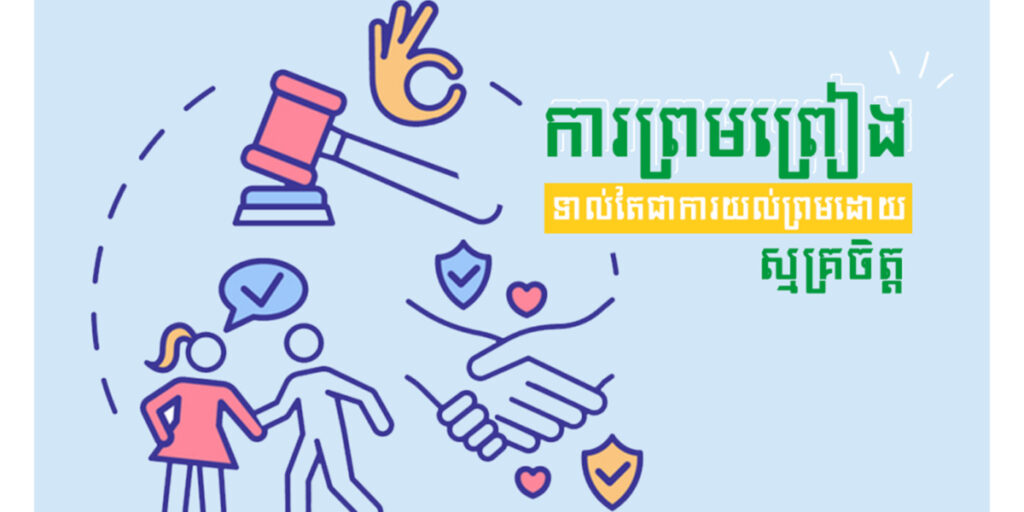
Once, consent was thought to be enough if it meant reciting the old rule of “no is no”. Today, that rule is no longer accepted, or rather it shouldn’t have been accepted in the first place.
That’s because real consent is not simply accepting rejection, but also giving respect to your partner’s decision whatever it may be without making your partner feel bad about it through guilt-tripping or coaxing. In this blog, we will learn more about the true form of consent, and why it matters.
Consent in legal context
There is no specific clause in the Criminal Code of The Kingdom of Cambodia that mentions consent exclusively or extends upon that word. However, as written in Cambodia’s Criminal Code (2009), rape is defined as, “any act of sexual penetration with a sexual organ or an object committed against another person of either sex by violence, coercion, threat or by being opportunistic.” [[1]]
This mention of sex by violence, coercion, threat or being opportunistic is rather reminiscent of what consent is, but it’s not well-defined enough to prove effective in court or practice.
What is affirmative consent?
Modern definition has upgraded consent to only be classified as such only if each partner expressed enthusiastic affirmation to any sexual act. This is called “affirmative consent”.
In short, affirmative consent can be easily defined as explicit, informed, and voluntary agreement to participate in a sexual act; i.e., yes means yes! That means that a sexual act should only be performed if the permission is asked of both partners, and both partners agree. Enthusiastically. Without being pressured mentally or physically by any means. [[2]]
It’s strictly not affirmative consent when:
- You perform other sexual acts than what the other partner has agreed to. For example, you force anal intercourse on your partner when they agreed to vaginal intercourse.
- You force your partner to agree to sexual acts with the use or threatened use of a weapon.
- You abuse the authority you have over the other partner and inducing them to agree to sexual acts.
- By using narcotics or any substance that influences your partner inability to consent with their own free will. [[3]]
Why is consent important?
Understanding consent means understanding sexual freedom and the sexual autonomy of a person, it’s respecting a person’s say regarding their body. Consent is an important part of sex education, and an essential part of the quest to cut down on sexual violence.
Consent even extends to the use of contraception during intercourse and family planning in relationships. Preventing your partner from the use of contraception and protective methods when your partner wishes to is a form of violation of their sexual reproductive health and rights.
Affirmative consent isn’t difficult to achieve when you respect another person’s control over their own body and understand that nobody owes you sexual intercourse.
If you have any questions about consent, or other sexual education topics, consult with @MarieStopesKH now:
✓ Send a Facebook message
✓ Every day from 7 am to 5 pm
✓ 012 999 002 or 098 999 102
✓ Send a message via LINE, Viber, WhatsApp, WeChat 093 24 08 23
✓ www.mariestopes.org.kh/contact-us-form/
[1] Criminal Code of The Kingdom of Cambodia (2009)
[2] https://news.usc.edu/159880/what-is-affirmative-consent-usc-prevent-sexual-violence/
[3] https://www.ashasexualhealth.org/understanding-consent
Get in touch
Contact us to learn more about us, receive free consultation, or book an appointment.
012 999 002 / 098 999 102








